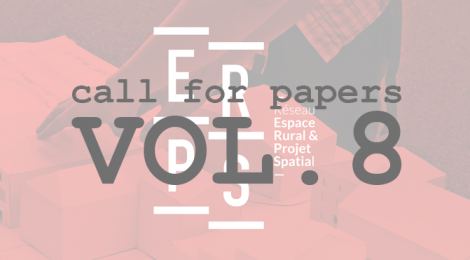
Call for papers ERPS vol. 8
8th vol. of the ERPS (Espace Rural Project Spatial) collection:
«Economic transitions and new ruralities » (provisional title)
forthcoming, Saint-Etienne University Press[1]
Download Call for Papers as PDF
General topic
Nowadays, new debates on post-growth economy are at stake, notably in reaction to the financial crises ; in France, new forms of social and solidary economy (SSE) are emerging, challenging the neoliberal economic model. Meanwhile in the UK, the « transition movement » initiated by Rob Hopkins[2] has increased in power through engaged citizen initiatives. These pave the way for a collective reflexion on post-growth We intend to contribute with this work to the exploration of links between civic initiatives and the new development modes they give shape to. This call for papers intends to contribute to the debate, while proposing a specific field of investigation : rural territories.
What is the role of disciplines of space and project in the increase of such initiatives in rural territory ?
In the panorama of different schools of thought relevant to post-growth – like bio-economics[3] or the so-called “pleasing sobriety[4]” or “convivial shrinkage[5]” to name but some of them – what singular concepts and approaches can one detect in rural territories? How does the consideration of such economic reflexions participate in new forms for conceiving, implementing and, upstream, programming space ?
Beyond Europe, one of the pioneer and emblematic figures having included such economic questions within spatial conception is Auburn, Alabama University’s Rural studio, already covered by the third volume of our collection[6]. Which are in France and Europe the teaching and research experiments where emerging post-growth economic questions are a leverage for the project approach ?
The call for papers addresses academic communities linked to disciplines of spatial planning and project ( architects, urban planners, landscape architects, designers , etc) as well as the humanities, particularly, the restitution of case studies in teaching and research, realized projects and bottom-up experiments exploring such stakes.
The stakes of post-growth may be dealt with at different scales of the organisation of everyday life : from the organisation of the home and dwelling to that of communities represented by the hamlet, the village or the small town.
In the fist case, one may seek to refer oneself mainly to the economical processes linked to the conception and the construction of an edifice, notably focussing on the diversity of circuits engaged in their building process, but also on the organisation of every day life of its inhabitants.
In the latter case, one may deal with the territorial space representing collective or interconnected stakes of communities. This scale may also question the content of urban planning documents, and their capacity to integrate economical stakes relevant to rural territories, but may also deal with different emerging co-conceived or negotiated project approaches.
The adoption of a certain analytical scale should be completed with interaction with other scales that may be relevant regarding principles of solidarity (subsidiarity, conviviality etc), existing between actors, instances and strategies of the designated spatial categories.
Format of the publication
This call for papers addresses French and international scientific communities: teachers, researchers, PhD students involved in spatial planning disciplines and humanities.
Selected papers will be published as articles in volume 8 of the ERPS collection at the Les contributions sélectionnées seront publiées sous forme d’un article dans le volume 8 de la collection ERPS at Saint-Etienne University Press (6 volumes published currently). A new bilingual format is adapted starting volume 7 (forthcoming February 2018).
This publication is a follow-up of the international symposium organized by ENSAP Bordeaux, UMR Passages and the ERPS and ARENA Alter-Rurality networks entitled economic transitions and new ruralities, held at Sabres, National Regional Parc les Landes de Gascogne, May 10th-12th 2017.
Calendar
Call for papers
- October / November 2017 : publication of the call
- Deadline for abstract submission : January 31st 2018
- Validation of proposals: March 31st 2018
- Submission of the full articles: June 30th 2018
Terms of submission of the abstracts and articles
Accepted languages: French, English
Submission: to be submitted at erps8bordeaux@gmail.com
Abstract text format: Word document, Arial 10, left aligned
Information to be provided:
- Name and first name of the main author, Institution;
- Contact info (email, telephone, postal address) ;
- Names, first names and institutions of eventual co-authors.
Length of the full article: between 12 000 et 15 000 characters (spaces included) + bibliography.
Iconographic credits and legends must be included, images must be free of copy-right for publication
Scientific Committee
Economists
UMR Passages : Abdourahmane Ndiaye
VetAgroSup : Olivier Aznar
Université de Toulouse : Geneviève Azam
CEMARAC : Laurent Rieutort
ERPS network members
Ensap Bordeaux : Xavier Guillot
Ensa Saint-Etienne : Manuel Bello-Marcano, Georges Henry Laffont
Ensa Clermont-Ferrand : Amélie Flamand, Géraldine Tixier
Ensa Nancy : Vincent Bradel
Ensa Normandie : Frédéric Saunier
INRA / AgroParisTech : Sylvie Lardon, Claire Planchat
Ensa Paris La Villette : Rosa Demarco
Ensp Versailles : Patrick Moquay
Ensa Grenoble : Romain Lajarge
Ensa Paris Belleville : Corinne Jaquand
Ensa Bretagne : Nadia Sbiti
Ensa Marseille : Florence Sarano
Ensa Lyon : Luna d’Emilio
ARENA alterRurality network members
ESA Paris : Pieter Versteegh
ESA Paris: Chris Younès
UCD Dublin: Sophia Meeres
DIT Dublin: Dominic Stevens
University of Westminster: Ben Stringer
University of Belgrade: Andelka Cirovic
[1] Release of the publication: fall 2019 for the opening of the 9th encounters of the ERPS network.
[2] Hopkins, R., 2008. The Transition Handbook : From Oil Dependency to Local Resilience, Chelsea Green Publishing.
[3] Georgescu-Roegen, N., 2013. « De la science économique à la bioéconomie », in Antoine Missemer, Nicholas Georgescu-Roegen, pour une révolution bioéconomique, ENS Editions, p. 87-128.
[4] Rahbi P., 2010. Vers la sobriété heureuse, Paris, Actes Sud.
[5] Illich, I., 1973. La convivialité, Paris, Le Seuil.
[6] Guillot, X. (dir.), 2012. Du terrain à la recherche : objets et stratégies, coll. Espace rural et projet spatial, vol. 3, Saint-Etienne, Presses Universitaires.

